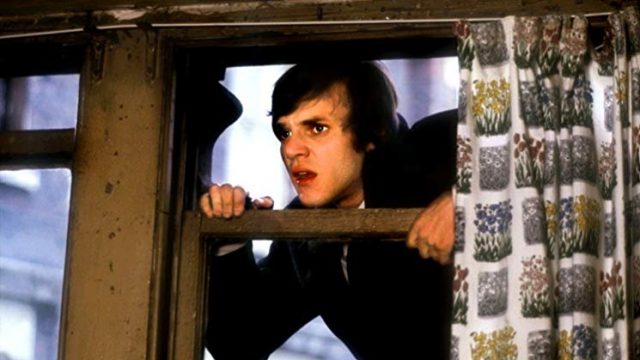I had no idea O Lucky Man! was the literal sequel Lindsay Anderson’s previous movie, If… until the movie was over. But that doesn’t matter. Like it or not, O Lucky Man! exists as a spiritual, unofficial sequel to the unforgettable A Clockwork Orange, if only because it’s impossible to not associate young Malcolm McDowell with Alex.
It helps that A Clockwork Orange ends with Alex in a pretty ambiguous state followed by a return to debauchery, while O Lucky Man! paints McDowell’s character Mick as a bit of a cypher. We don’t get the impression that this is a particularly good person, but an ambitious one who’s willing to play the system to get ahead, even if the system is doing some horrible things to people and there’s no reason why it won’t do the same to him someday.
If O Lucky Man! is a spiritual sequel to A Clockwork Orange, it’s also a spiritual prequel to Sorry to Bother You. I decided to watch this film so I could see what inspired Boots Riley and the connection is clear. What Sorry to Bother You has that O Lucky Man! doesn’t is compelling, detailed characters to pull you through its narrative. Mick goes to prison and becomes a reformed man (not unlike Alex). Unlike A Clockwork Orange, we don’t get to see the mechanism that made his internal clock do a 180. He just exits prison with faith in his fellow man and wanting to help. At one point before his sentence, he speaks the moral of O Lucky Man! :”I am just a man who tried to be successful.” We get it. I got it much earlier than that didactic line, while all the time never really buying it. We all heard the consequences to capitalism in the background. You did too and you didn’t care. Also donating your only source of savings after getting out of prison to the church is a dumb, shortsighted thing to do and I refuse to have any sympathy for someone who donates their savings and then complains that they have nothing.
Some reviews called Mick naive and oblivious because he’s proactively participating in a system that keeps abusing past employees, but I think he just doesn’t care about the repercussions of his work until it negatively impacts him. He hustles to get ahead throughout the film, frequently diving back in to the working world after escaping his last gig, in spite of the background noise that should warn him away. He’s less sympathetic than Cassius Green in Sorry to Bother You because we don’t get a sense of his responsibilities or why he needs to succeed in these jobs. He keeps seeking out these jobs, even going so far as to weasel his way in to one based on a chance meeting (and hookup!) with a businessman’s daughter followed by being in the right place in the right time when that businessman’s previous assistant falls to his death out the window because another disgruntled employee came to air his grievances.
I did enjoy the scene where Mick shimmies up a building to try to save a suicidal mother who has actual responsibilities that she can’t fulfill because of capitalism. That felt out of a French New Wave or Italian Neorealist film. I liked the theatrical technique of assigning many actors several different parts, but I was very distracted, as you might imagine, with the use of black face on Arthur Lowe to play Dr. Mundo.
O Lucky Man! has so many riches over the course of its three hour runtime (I haven’t even touched on the great performance given by a young Helen Mirren), but it needs a little more plot and a much more compelling protagonist than it’s got, which is weird, because Malcolm McDowell is a very compelling actor. I really liked the songs and how they were sung by the band that gets inserted into the story midway through. Maybe I would enjoy the same footage rearranged. It’s one of those films that you admire more than enjoy.

